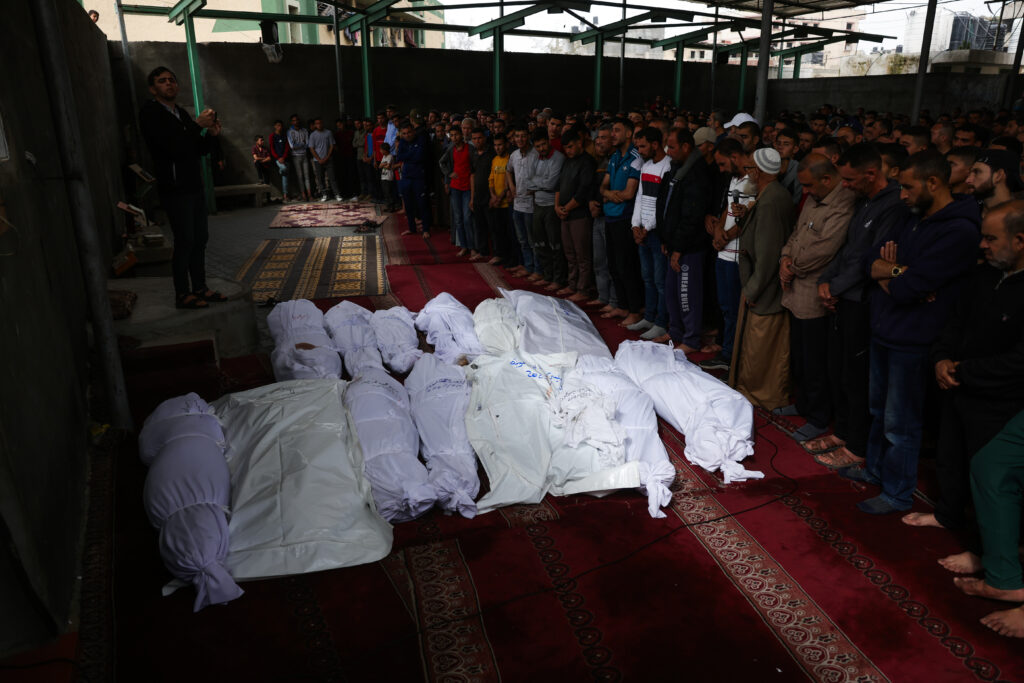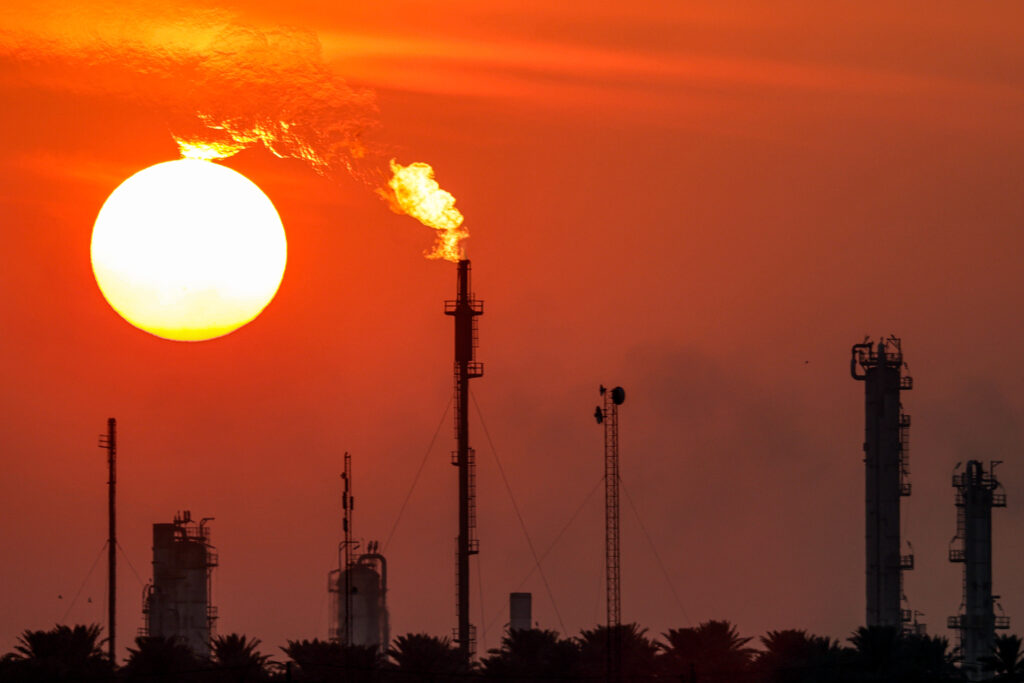Macron réinvestit tous azimuts la scène hexagonale et avance vers un référendum
Déjà omniprésent sur la situation internationale, Emmanuel Macron a longuement abordé, mardi soir sur TF1, de nombreux aspects de la politique française, évoquant des pistes de référendums en cas de blocage parlementaire et défendant âprement son bilan, notamment la réforme des retraites.Pendant plus de trois heures, répondant au journaliste Gilles Bouleau et à plusieurs intervenants dans un débat qui a dépassé le temps imparti, le chef de l’Etat a semblé tourner une page.Il a largement réinvesti le champ de la politique hexagonale, des prisons à la politique fiscale en passant par le financement du modèle social, alors même qu’il est privé de majorité à l’Assemblée nationale depuis la dissolution qui le cantonnait ces derniers mois à son rôle diplomatique. Comme du temps où il décidait de tout, le président a même énoncé quelques demandes au gouvernement de François Bayrou, censé avoir la main.Il a ainsi prôné la tenue d’une “conférence sociale” sur le “financement de notre modèle social” qui, a-t-il jugé, repose “beaucoup trop sur le travail” alors qu’il pourrait par exemple puiser dans la “consommation”. Idem sur une “négociation sociale” sur “la qualité” et “l’évolution des formes de travail”.-Référendum: “ne rien s’interdire”-Attendu sur le sujet, Emmanuel Macron a expliqué “ne rien s’interdire” en matière de référendum, “à chaque fois qu’on sera trop lent ou bloqué par la situation politique”, comme un coup de pression aux partis pour qu’ils fassent des compromis. Sans pour autant annoncer de projet arrêté de consultation des Français à ce stade.”Je souhaite qu’on puisse organiser une consultation multiple”, “plusieurs référendums en même temps dans les mois qui viennent”, a-t-il précisé, évoquant en exemple une possible question sur les écrans et l’accès aux réseaux sociaux pour les moins de 15 ans.Interrogé sur la fin de vie, après un témoignage de l’ancien journaliste Charles Biétry atteint de la maladie de Charcot, il a dit souhaiter que la proposition de loi en cours d’examen “soit votée” au Parlement. Mais sans exclure d’en appeler aux Français en cas d'”enlisement” parlementaire.Il a également répondu “pourquoi pas” à l’idée d’un référendum sur les finances publiques prônée par François Bayrou, dont il attend cependant encore “le plan”. Mais pas sur le budget lui-même, prérogative des députés et sénateurs, plutôt sur d’éventuelles “réformes” du Premier ministre “sur le plan économique et social”.Il a en revanche rejeté l’hypothèse d’un référendum sur l’immigration, malgré les demandes répétées de la droite et de l’extrême droite. Ainsi que sur les retraites, comme l’a réclamé la secrétaire générale de la CGT Sophie Binet sur le plateau de l’émission.Il lui a rappelé avoir été réélu en prônant une réforme des retraites. “En face de vous, vous aviez l’extrême droite, même moi j’ai voté pour vous”, a ironisé la syndicaliste.Pour le reste, Emmanuel Macron, qui vient de fêter ses huit ans à l’Elysée, a longuement défendu son bilan économique et social, et justifié l’état dégradé des finances publiques par les nombreuses crises traversées.Pas question d’augmenter les impôts, même sur les plus aisés. Ni de nationaliser ArcelorMittal, touché par un plan social, mais dont il s’est engagé “les yeux dans les yeux” à “sauver” les sites de Dunkerque (Nord) et Fos-sur-Mer (Bouches-du-Rhône).Confronté au maire de Béziers Robert Ménard sur les questions d’insécurité et d’immigration, le président a prôné une loi étendant les pouvoirs des polices municipales.Il s’est également dit favorable à la location, “si besoin était”, de places de prison à l’étranger pour lutter contre la surpopulation carcérale. – “Rester libre” en Europe -Souvent attaqué par ses interlocuteurs sur sa droite ou sur sa gauche, comme par des Français anonymes, Emmanuel Macron a estimé que la France était un pays “un peu pessimiste”. “Mais bon Dieu, on est le plus beau pays du monde”, “si on voulait, on casserait tous les records”, a-t-il lancé.”Non Emmanuel Macron, si la France va mal, ce n’est pas +parce qu’elle est pessimiste+! C’est à cause de votre bilan”, lui a répondu Eric Ciotti, allié de l’extrême droite, sur le réseau X.Le président du Rassemblement national Jordan Bardella a dénoncé son “impuissance généralisée”.”Il n’a rien dit, rien proposé”, a critiqué le leader de La France insoumise Jean-Luc Mélenchon, quand le patron des socialistes Olivier Faure a déploré “trois heures pour dire aux Français que rien ne va changer”.Lors de la première partie de l’émission consacrée aux questions internationales, le chef de l’Etat avait énoncé “le défi des défis”: “rester libre”, “dans un monde de plus en plus dangereux”.De retour de Kiev, il a redit que les Européens entendaient “prendre des sanctions” dans les prochains jours si la Russie “confirme le non-respect” d’un cessez-le-feu en Ukraine. Une telle trêve doit permettre des négociations “territoriales”, a-t-il ajouté, assurant que “même les Ukrainiens” avaient “la lucidité de dire (…) qu’ils n’auront pas la capacité de reprendre l’intégralité de ce qui est pris depuis 2014” par Moscou.Le chef de l’Etat a aussi explicité le possible élargissement du parapluie nucléaire français aux alliés européens, évoqué depuis le retour de Donald Trump à la Maison Blanche qui fait planer le doute sur la garantie américaine.La France est “prête à ouvrir” une discussion sur le déploiement d’avions français armés de “bombes” nucléaires dans d’autres pays européens, à l’instar de ce que font jusqu’ici les Américains, a-t-il annoncé.Ce que fait le gouvernement israélien de Benjamin Netanyahu, “c’est une honte”, a par ailleurs répondu le président à propos de la situation à Gaza, jugeant cependant que “ce n’est pas à un président de la République de dire +ceci est un génocide+, mais aux historiens”.pol-vl-bpa-fff/hr/lpa
Macron réinvestit tous azimuts la scène hexagonale et avance vers un référendum
Déjà omniprésent sur la situation internationale, Emmanuel Macron a longuement abordé, mardi soir sur TF1, de nombreux aspects de la politique française, évoquant des pistes de référendums en cas de blocage parlementaire et défendant âprement son bilan, notamment la réforme des retraites.Pendant plus de trois heures, répondant au journaliste Gilles Bouleau et à plusieurs intervenants dans un débat qui a dépassé le temps imparti, le chef de l’Etat a semblé tourner une page.Il a largement réinvesti le champ de la politique hexagonale, des prisons à la politique fiscale en passant par le financement du modèle social, alors même qu’il est privé de majorité à l’Assemblée nationale depuis la dissolution qui le cantonnait ces derniers mois à son rôle diplomatique. Comme du temps où il décidait de tout, le président a même énoncé quelques demandes au gouvernement de François Bayrou, censé avoir la main.Il a ainsi prôné la tenue d’une “conférence sociale” sur le “financement de notre modèle social” qui, a-t-il jugé, repose “beaucoup trop sur le travail” alors qu’il pourrait par exemple puiser dans la “consommation”. Idem sur une “négociation sociale” sur “la qualité” et “l’évolution des formes de travail”.-Référendum: “ne rien s’interdire”-Attendu sur le sujet, Emmanuel Macron a expliqué “ne rien s’interdire” en matière de référendum, “à chaque fois qu’on sera trop lent ou bloqué par la situation politique”, comme un coup de pression aux partis pour qu’ils fassent des compromis. Sans pour autant annoncer de projet arrêté de consultation des Français à ce stade.”Je souhaite qu’on puisse organiser une consultation multiple”, “plusieurs référendums en même temps dans les mois qui viennent”, a-t-il précisé, évoquant en exemple une possible question sur les écrans et l’accès aux réseaux sociaux pour les moins de 15 ans.Interrogé sur la fin de vie, après un témoignage de l’ancien journaliste Charles Biétry atteint de la maladie de Charcot, il a dit souhaiter que la proposition de loi en cours d’examen “soit votée” au Parlement. Mais sans exclure d’en appeler aux Français en cas d'”enlisement” parlementaire.Il a également répondu “pourquoi pas” à l’idée d’un référendum sur les finances publiques prônée par François Bayrou, dont il attend cependant encore “le plan”. Mais pas sur le budget lui-même, prérogative des députés et sénateurs, plutôt sur d’éventuelles “réformes” du Premier ministre “sur le plan économique et social”.Il a en revanche rejeté l’hypothèse d’un référendum sur l’immigration, malgré les demandes répétées de la droite et de l’extrême droite. Ainsi que sur les retraites, comme l’a réclamé la secrétaire générale de la CGT Sophie Binet sur le plateau de l’émission.Il lui a rappelé avoir été réélu en prônant une réforme des retraites. “En face de vous, vous aviez l’extrême droite, même moi j’ai voté pour vous”, a ironisé la syndicaliste.Pour le reste, Emmanuel Macron, qui vient de fêter ses huit ans à l’Elysée, a longuement défendu son bilan économique et social, et justifié l’état dégradé des finances publiques par les nombreuses crises traversées.Pas question d’augmenter les impôts, même sur les plus aisés. Ni de nationaliser ArcelorMittal, touché par un plan social, mais dont il s’est engagé “les yeux dans les yeux” à “sauver” les sites de Dunkerque (Nord) et Fos-sur-Mer (Bouches-du-Rhône).Confronté au maire de Béziers Robert Ménard sur les questions d’insécurité et d’immigration, le président a prôné une loi étendant les pouvoirs des polices municipales.Il s’est également dit favorable à la location, “si besoin était”, de places de prison à l’étranger pour lutter contre la surpopulation carcérale. – “Rester libre” en Europe -Souvent attaqué par ses interlocuteurs sur sa droite ou sur sa gauche, comme par des Français anonymes, Emmanuel Macron a estimé que la France était un pays “un peu pessimiste”. “Mais bon Dieu, on est le plus beau pays du monde”, “si on voulait, on casserait tous les records”, a-t-il lancé.”Non Emmanuel Macron, si la France va mal, ce n’est pas +parce qu’elle est pessimiste+! C’est à cause de votre bilan”, lui a répondu Eric Ciotti, allié de l’extrême droite, sur le réseau X.Le président du Rassemblement national Jordan Bardella a dénoncé son “impuissance généralisée”.”Il n’a rien dit, rien proposé”, a critiqué le leader de La France insoumise Jean-Luc Mélenchon, quand le patron des socialistes Olivier Faure a déploré “trois heures pour dire aux Français que rien ne va changer”.Lors de la première partie de l’émission consacrée aux questions internationales, le chef de l’Etat avait énoncé “le défi des défis”: “rester libre”, “dans un monde de plus en plus dangereux”.De retour de Kiev, il a redit que les Européens entendaient “prendre des sanctions” dans les prochains jours si la Russie “confirme le non-respect” d’un cessez-le-feu en Ukraine. Une telle trêve doit permettre des négociations “territoriales”, a-t-il ajouté, assurant que “même les Ukrainiens” avaient “la lucidité de dire (…) qu’ils n’auront pas la capacité de reprendre l’intégralité de ce qui est pris depuis 2014” par Moscou.Le chef de l’Etat a aussi explicité le possible élargissement du parapluie nucléaire français aux alliés européens, évoqué depuis le retour de Donald Trump à la Maison Blanche qui fait planer le doute sur la garantie américaine.La France est “prête à ouvrir” une discussion sur le déploiement d’avions français armés de “bombes” nucléaires dans d’autres pays européens, à l’instar de ce que font jusqu’ici les Américains, a-t-il annoncé.Ce que fait le gouvernement israélien de Benjamin Netanyahu, “c’est une honte”, a par ailleurs répondu le président à propos de la situation à Gaza, jugeant cependant que “ce n’est pas à un président de la République de dire +ceci est un génocide+, mais aux historiens”.pol-vl-bpa-fff/hr/lpa
Macron réinvestit tous azimuts la scène hexagonale et avance vers un référendum
Déjà omniprésent sur la situation internationale, Emmanuel Macron a longuement abordé, mardi soir sur TF1, de nombreux aspects de la politique française, évoquant des pistes de référendums en cas de blocage parlementaire et défendant âprement son bilan, notamment la réforme des retraites.Pendant plus de trois heures, répondant au journaliste Gilles Bouleau et à plusieurs intervenants dans un débat qui a dépassé le temps imparti, le chef de l’Etat a semblé tourner une page.Il a largement réinvesti le champ de la politique hexagonale, des prisons à la politique fiscale en passant par le financement du modèle social, alors même qu’il est privé de majorité à l’Assemblée nationale depuis la dissolution qui le cantonnait ces derniers mois à son rôle diplomatique. Comme du temps où il décidait de tout, le président a même énoncé quelques demandes au gouvernement de François Bayrou, censé avoir la main.Il a ainsi prôné la tenue d’une “conférence sociale” sur le “financement de notre modèle social” qui, a-t-il jugé, repose “beaucoup trop sur le travail” alors qu’il pourrait par exemple puiser dans la “consommation”. Idem sur une “négociation sociale” sur “la qualité” et “l’évolution des formes de travail”.-Référendum: “ne rien s’interdire”-Attendu sur le sujet, Emmanuel Macron a expliqué “ne rien s’interdire” en matière de référendum, “à chaque fois qu’on sera trop lent ou bloqué par la situation politique”, comme un coup de pression aux partis pour qu’ils fassent des compromis. Sans pour autant annoncer de projet arrêté de consultation des Français à ce stade.”Je souhaite qu’on puisse organiser une consultation multiple”, “plusieurs référendums en même temps dans les mois qui viennent”, a-t-il précisé, évoquant en exemple une possible question sur les écrans et l’accès aux réseaux sociaux pour les moins de 15 ans.Interrogé sur la fin de vie, après un témoignage de l’ancien journaliste Charles Biétry atteint de la maladie de Charcot, il a dit souhaiter que la proposition de loi en cours d’examen “soit votée” au Parlement. Mais sans exclure d’en appeler aux Français en cas d'”enlisement” parlementaire.Il a également répondu “pourquoi pas” à l’idée d’un référendum sur les finances publiques prônée par François Bayrou, dont il attend cependant encore “le plan”. Mais pas sur le budget lui-même, prérogative des députés et sénateurs, plutôt sur d’éventuelles “réformes” du Premier ministre “sur le plan économique et social”.Il a en revanche rejeté l’hypothèse d’un référendum sur l’immigration, malgré les demandes répétées de la droite et de l’extrême droite. Ainsi que sur les retraites, comme l’a réclamé la secrétaire générale de la CGT Sophie Binet sur le plateau de l’émission.Il lui a rappelé avoir été réélu en prônant une réforme des retraites. “En face de vous, vous aviez l’extrême droite, même moi j’ai voté pour vous”, a ironisé la syndicaliste.Pour le reste, Emmanuel Macron, qui vient de fêter ses huit ans à l’Elysée, a longuement défendu son bilan économique et social, et justifié l’état dégradé des finances publiques par les nombreuses crises traversées.Pas question d’augmenter les impôts, même sur les plus aisés. Ni de nationaliser ArcelorMittal, touché par un plan social, mais dont il s’est engagé “les yeux dans les yeux” à “sauver” les sites de Dunkerque (Nord) et Fos-sur-Mer (Bouches-du-Rhône).Confronté au maire de Béziers Robert Ménard sur les questions d’insécurité et d’immigration, le président a prôné une loi étendant les pouvoirs des polices municipales.Il s’est également dit favorable à la location, “si besoin était”, de places de prison à l’étranger pour lutter contre la surpopulation carcérale. – “Rester libre” en Europe -Souvent attaqué par ses interlocuteurs sur sa droite ou sur sa gauche, comme par des Français anonymes, Emmanuel Macron a estimé que la France était un pays “un peu pessimiste”. “Mais bon Dieu, on est le plus beau pays du monde”, “si on voulait, on casserait tous les records”, a-t-il lancé.”Non Emmanuel Macron, si la France va mal, ce n’est pas +parce qu’elle est pessimiste+! C’est à cause de votre bilan”, lui a répondu Eric Ciotti, allié de l’extrême droite, sur le réseau X.Le président du Rassemblement national Jordan Bardella a dénoncé son “impuissance généralisée”.”Il n’a rien dit, rien proposé”, a critiqué le leader de La France insoumise Jean-Luc Mélenchon, quand le patron des socialistes Olivier Faure a déploré “trois heures pour dire aux Français que rien ne va changer”.Lors de la première partie de l’émission consacrée aux questions internationales, le chef de l’Etat avait énoncé “le défi des défis”: “rester libre”, “dans un monde de plus en plus dangereux”.De retour de Kiev, il a redit que les Européens entendaient “prendre des sanctions” dans les prochains jours si la Russie “confirme le non-respect” d’un cessez-le-feu en Ukraine. Une telle trêve doit permettre des négociations “territoriales”, a-t-il ajouté, assurant que “même les Ukrainiens” avaient “la lucidité de dire (…) qu’ils n’auront pas la capacité de reprendre l’intégralité de ce qui est pris depuis 2014” par Moscou.Le chef de l’Etat a aussi explicité le possible élargissement du parapluie nucléaire français aux alliés européens, évoqué depuis le retour de Donald Trump à la Maison Blanche qui fait planer le doute sur la garantie américaine.La France est “prête à ouvrir” une discussion sur le déploiement d’avions français armés de “bombes” nucléaires dans d’autres pays européens, à l’instar de ce que font jusqu’ici les Américains, a-t-il annoncé.Ce que fait le gouvernement israélien de Benjamin Netanyahu, “c’est une honte”, a par ailleurs répondu le président à propos de la situation à Gaza, jugeant cependant que “ce n’est pas à un président de la République de dire +ceci est un génocide+, mais aux historiens”.pol-vl-bpa-fff/hr/lpa
Coiffeur, masseur, traiteur : Airbnb se lance dans les services à domicile
Airbnb a annoncé mardi ajouter des services à domicile allant des soins de beauté et bien-être à la préparation de repas sur son application, une tentative de diversification majeure de l’entreprise californienne connue pour la réservation de logements.Les utilisateurs vont pouvoir réserver les services des différents professionnels aussi bien en voyage dans une location que chez eux, s’ils se trouvent dans l’une des 260 villes où Airbnb va lancer sa nouvelle offre, avant de l’étendre.”Les hôtels ont quelque chose que nous n’avons pas: les services”, a lancé sur scène Brian Chesky, cofondateur et patron d’Airbnb, lors d’une conférence à Los Angeles.Dans un hôtel, “vous pouvez commander des repas dans votre chambre. Vous avez accès à une mini salle de sport, un spa, vous faire masser…”, a-t-il énuméré.L’entreprise a précisé que les services ajoutés ont été sélectionnés à partir de plusieurs critères, y compris “l’expertise et la renommée” des professionnels, qui ont “en moyenne 10 ans d’expérience”, et ont fourni des preuves de leur identité et de leurs certifications.Outre les photographes, manucures et chefs à domicile, Airbnb a revu et amélioré son offre d'”expériences”, des visites et activités proposées par des habitants des destinations touristiques.La plateforme va aussi proposer des expériences de luxe, baptisées “Airbnb Originals”, comme de jouer au beach-volley avec l’athlète olympique Carol Solberg sur une plage à Rio, au Brésil, ou de rencontrer la chanteuse Megan Thee Stallion à Los Angeles, dans une attraction qui mélange cosplay et jeux vidéo.Sur son application, Airbnb va désormais mettre en avant les logements, les services et les expériences, et envoyer des recommandations personnalisées aux utilisateurs pendant leur séjour.- Diversification -Pour grignoter des parts de marché aux hôtels, Airbnb avait jusqu’à présent mis l’accent sur son cœur de métier : rendre la réservation de logements plus facile, moins chère et surtout plus fiable, son point faible selon Brian Chesky.”Pour une personne qui réserve un Airbnb, nous estimons que neuf personnes prennent une chambre d’hôtel. (…) Et les clients disent faire ce choix avant tout parce qu’ils trouvent Airbnb moins fiable historiquement que l’hôtel”, a-t-il noté lors d’une conférence aux analystes au début du mois.Mais cette stratégie ne suffit plus. Airbnb a besoin de se diversifier, pour moins dépendre de la réservation de logements, a commenté l’analyste indépendante Carolina Milanesi.L’ajout de services va générer “plus de trafic sur l’application, les gens vont y retourner plus souvent, pas seulement pour leur semaine annuelle de vacances”, a-t-elle expliqué à l’AFP.Et l’entreprise se positionne ainsi sur un marché encore peu exploité : “Je ne vois pas d’autre appli où vous pouvez trouver tout ça”, a souligné l’experte.Après la période noire de la pandémie, qui a un temps menacé d’annihiler Airbnb, les voyageurs sont revenus. Mais l’entreprise continue de faire face à de nombreuses difficultés.L’incertitude économique actuelle, liée aux politiques commerciales erratiques de Donald Trump, pèse sur les déplacements internationaux.”Nous constatons qu’il est moins populaire de venir aux Etats-Unis qu’il y a un an, ou même qu’en début d’année”, a reconnu Brian Chesky début mai.Il a toutefois précisé que ce segment représente “une toute petite partie” des affaires de son groupe.Airbnb fait aussi toujours face à l’animosité des autorités dans de nombreuses grandes villes, de Paris à New York, qui lui reprochent de contribuer à la flambée des loyers et au manque de logements disponibles à la location de longue durée. La France a ainsi adopté en novembre dernier une loi pour réformer la fiscalité sur les meublés touristiques, jusqu’à présent plus favorable que celle pesant sur les logements classiques, et autoriser les maires à réguler ce marché, avec des quotas pour ce type de locations, notamment.Le groupe de San Francisco a réalisé 11 milliards de dollars de chiffre d’affaires en 2024, en hausse de 12% sur un an, dont elle a dégagé 2,6 milliards de dollars de bénéfice net.
White House slams Episcopal Church’s refusal to resettle white South Africans
The White House questioned Tuesday the humanitarian commitment of the influential Episcopal Church after it refused to comply with a federal directive to help resettle white Afrikaners granted refugee status by the Trump administration.Trump ran on an anti-immigrant platform and essentially halted refugee arrivals in the United States after taking office, but made an exception for white Afrikaners despite South Africa’s insistence that they do not face persecution in their homeland.On Monday, around 50 white South Africans arrived for resettlement in the United States, after Trump granted them refugee status as victims of what he called a “genocide.”That claim — oft-repeated by Trump’s Pretoria-born ally, billionaire Elon Musk — has been widely dismissed as absurd, including by the South African government. On Monday, the Episcopal Church said it would end its refugee resettlement program with the US government rather than comply with orders to help resettle the white South Africans.In a statement, White House Deputy Press Secretary Anna Kelly criticized the decision as raising “serious questions about its (the Church’s) supposed commitment to humanitarian aid.”She claimed white Afrikaners — who are primarily descendants of European colonizers and whose ethnic group dominated South African politics until apartheid was abolished in 1994 — had “faced unspeakable horrors.”On Monday, the church had said it would wind up its refugee resettlement grant agreements — amounting to more than $50 million annually — with the US federal government rather than comply with Trump’s orders.In a statement, the church’s presiding bishop was scathing in his criticism of the administration’s decision to grant the white South Africans refugee status.”It has been painful to watch one group of refugees, selected in a highly unusual manner, receive preferential treatment over many others who have been waiting in refugee camps or dangerous conditions for years,” said Sean W. Rowe.Under eligibility guidelines published by the US embassy, applicants for US resettlement must either be of Afrikaner ethnicity or belong to a racial minority in South Africa.The Episcopal Church said that it could not comply with Trump’s order “in light of our church’s steadfast commitment to racial justice and reconciliation.” It said its programs with the US federal government would be wound up by the end of the fiscal year, but that its work on refugee resettlement would continue, including supporting recently arrived refugees from around the world.
White House slams Episcopal Church’s refusal to resettle white South AfricansTue, 13 May 2025 22:22:41 GMT
The White House questioned Tuesday the humanitarian commitment of the influential Episcopal Church after it refused to comply with a federal directive to help resettle white Afrikaners granted refugee status by the Trump administration.Trump ran on an anti-immigrant platform and essentially halted refugee arrivals in the United States after taking office, but made an exception …
UN relief chief urges action ‘to prevent genocide’ in Gaza
United Nations relief chief Tom Fletcher on Tuesday called on the UN Security Council to take action “to prevent genocide” in Gaza, delivering a scathing account of Israel’s actions in the Palestinian territory.Fletcher, the UN Under-Secretary-General for Humanitarian Affairs, demanded that Israel lift its aid blockade on Gaza, where its offensive has killed tens of thousands and reduced much of the enclave to rubble.”For those killed and those whose voices are silenced: what more evidence do you need now?” asked Fletcher. “Will you act — decisively — to prevent genocide and to ensure respect for international humanitarian law?”He alleged that Israel was “deliberately and unashamedly imposing inhumane conditions on civilians in the Occupied Palestinian Territory.”Fletcher said UN agencies had “life-saving supplies” ready to deliver at the borders but were denied access by Israel. He also decried Israel’s conditions for allowing aid delivery as “a cynical sideshow.””It makes starvation a bargaining chip,” Fletcher said. “A deliberate distraction. A fig leaf for further violence and displacement. If any of this still matters, have no part in it.”The Israeli proposal for aid deliveries, the details of which have not been made public, “practically excludes many, including people with disabilities, women, children, the elderly and the wounded,” he said.In a joint statement, five European members of the UN Security Council said that they were “deeply concerned” at the Israeli plan, “which the UN has said would not meet humanitarian principles.””Humanitarian aid must never be used as a political tool or a military tactic,” read the statement by France, Britain, Slovenia, Greece and Denmark.Israel’s ambassador to the UN, Danny Danon, rejected the allegations against his government as “baseless and outrageous accusations.”- ‘Children scream’ -The UN relief chief warned that while the International Court of Justice deliberated over whether Israel’s actions in Gaza constituted genocide, “it will be too late.””We have briefed this Council in great detail on the extensive civilian harm we witness daily: death, injury, destruction, hunger, disease, torture, other cruel, inhuman or degrading treatment, repeated displacement, on a large scale.”We have described the deliberate obstruction of aid operations and the systematic dismantling of Palestinian life, and that which sustains it, in Gaza,” he said.On Tuesday, Israeli strikes on Gaza continued, with rescue officials saying an attack near a hospital in the south of the territory killed at least 28 people.Israeli Prime Minister Benjamin Netanyahu has announced his military would enter Gaza “with full force” in the coming days, after recommencing operations having broken a ceasefire two months ago. The war began in October 2023 after a Hamas attack on Israel resulted in the deaths of 1,218 people, mostly civilians, according to an AFP tally based on official data.Israel launched a withering offensive in response, killing at least 52,908 people — mostly civilians — according to data from the Hamas-run health ministry, which is considered reliable by the UN.It has also targeted civilian infrastructure, destroying roads, schools, hospitals and residential neighborhoods, alleging that Hamas was using them as cover.”I can tell you from having visited what’s left of Gaza’s medical system that death on this scale has a sound and a smell that does not leave you,” said Fletcher. “As one nurse described it: ‘children scream as we peel burnt fabric from their skin.'”The senior official charged that the UN Security Council was not doing enough to prevent the violence.”For those who will not survive what we fear is coming — in plain sight — it will be no consolation to know that future generations will hold us in this chamber to account,” he said.”But they will. And, if we have not seriously done ‘all we could,’ we should fear that judgment.”
US stocks mostly rise on better inflation data while dollar retreats
Wall Street stocks mostly rose Tuesday while oil prices advanced, extending a rally as the improved state of US-China trade boosts the economic outlook. Both the S&P 500 and Nasdaq finished solidly higher following benign US inflation data while the Dow retreated after weakness in UnitedHealth Group shares.Markets continued to cheer the US-China announcement Monday of a de-escalation of trade tensions. The two countries agreed to significantly lower levies for 90 days while they work to hash out an agreement.The tech-rich Nasdaq led major US indices, winning 1.6 percent.Oil prices also climbed more than two percent as traders pencil in more oil demand.”It seems as if the euphoria that was ignited yesterday or over the weekend has continued into today at least for the S&P 500 and the Nasdaq,” said Sam Stovall of CFRA Research.The consumer price index eased to 2.3 percent in April from a year ago, a tick below the 2.4 percent figure recorded in March.Some analysts cautioned that it was still too early to see the implications of US President Donald Trump’s tariff policies, some of which have been rolled back or suspended.But the weaker inflation data put pressure on the dollar, with more traders betting the Federal Reserve will soon cut interest rates.In Europe, London closed barely changed, while Paris and Frankfurt both ticked up 0.3 percent.Asian equities had finished with strong gains, in their catch-up session digesting Wall Street’s jump on Monday, although Hong Kong dropped nearly two percent on profit-taking.On the corporate front, the big focus was on the auto sector after major news out of Japan.Nissan posted an annual net loss of $4.5 billion, confirmed plans to slash 15 percent of its global workforce and warned about the possible impact of US tariffs.The carmaker, whose mooted merger with Honda collapsed this year, is heavily indebted and engaged in an expensive business restructuring plan.For its part, Honda on Tuesday forecast a 70-percent drop in net profit for the 2025-26 financial year.”The impact of tariff policies in various countries on our business has been very significant, and frequent revisions are being made, making it difficult to formulate an outlook,” said Honda chief executive Toshihiro Mibe.- Key figures at around 2050 GMT -New York – Dow: DOWN 0.6 percent at 42,140.43 (close)New York – S&P 500: UP 0.7 percent at 5,886.55 (close)New York – Nasdaq Composite: UP 1.6 percent at 19,010.08 (close)London – FTSE 100: FLAT at 8,602.92 (close)Paris – CAC 40: UP 0.3 percent at 7,873.83 (close)Frankfurt – DAX: UP 0.3 percent at 23,638.56 (close)Tokyo – Nikkei 225: UP 1.4 percent at 38,183.26 (close)Hong Kong – Hang Seng Index: DOWN 1.9 percent at 23,108.27 (close)Shanghai – Composite: UP 0.2 percent at 3,374.87 (close)Euro/dollar: UP at $1.1189 from $1.1087 on MondayPound/dollar: UP at $1.3304 from $1.3176Dollar/yen: DOWN at 147.47 yen from 148.46 yenEuro/pound: DOWN at 84.07 pence from 84.14 penceBrent North Sea Crude: UP 2.6 percent at $66.63 per barrelWest Texas Intermediate: UP 2.8 percent at $63.67 per barrelburs-jmb/jgc








